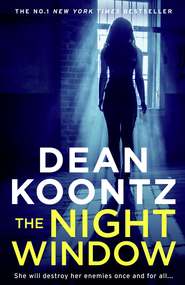По всем вопросам обращайтесь на: info@litportal.ru
(©) 2003-2025.
✖
Odd Hours
Автор
Год написания книги
2018
Настройки чтения
Размер шрифта
Высота строк
Поля
Consequently, Hutch feared contracting the ravenous germ. From time to time, like a dour character in a tale by Poe, he huddled in his lamplit study, brooding about his fate, about the fragility of his flesh, about the insatiable appetite of his microscopic foe.
He especially dreaded that his nose might be eaten away.
Long ago, his face had been famous. Although time had disguised him, he still took pride in his appearance.
I had seen a few of Lawrence Hutchison’s movies from the 1940s and ’50s. I liked them. He’d been a commanding presence on screen.
Because he had not appeared on camera for five decades, Hutch was less known for his acting than for his children’s books about a swashbuckling rabbit named Nibbles. Unlike his creator, Nibbles was fearless.
Film money, book royalties, and a habit of regarding investment opportunities with paranoid suspicion had left Hutch financially secure in his old age. Nevertheless, he worried that an explosive rise in the price of oil or a total collapse in the price of oil would lead to a worldwide financial crisis that would leave him penniless.
His house faced the boardwalk, the beach, the ocean. Surf broke less than a minute’s stroll from his front door.
Over the years, he had come to fear the sea. He could not bear to sleep on the west side of the house, where he might hear the waves crawling along the shore.
Therefore, I was quartered in the ocean-facing master suite at the front of the house. He slept in a guest room at the back.
Within a day of arriving in Magic Beach, more than a month previous to the red-tide dream, I had taken a job as Hutch’s cook, doubling as his chauffeur on those infrequent occasions when he wanted to go out.
My experience at the Pico Mundo Grill served me well. If you can make hash browns that wring a flood from salivary glands, fry bacon to the crispness of a cracker without parching it, and make pancakes as rich as pudding yet so fluffy they seem to be at risk of floating off the plate, you will always find work.
At four-thirty that afternoon in late January, when I stepped into the parlor with Boo, my dog, Hutch was in his favorite armchair, scowling at the television, which he had muted.
“Bad news, sir?”
His deep and rounded voice rolled an ominous note into every syllable: “Mars is warming.”
“We don’t live on Mars.”
“It’s warming at the same rate as the earth.”
“Were you planning to move to Mars to escape global warming?”
He indicated the silenced anchorman on the TV. “This means the sun is the cause of both, and nothing can be done about it. Nothing.”
“Well, sir, there’s always Jupiter or whatever planet lies beyond Mars.”
He fixed me with that luminous gray-eyed stare that conveyed implacable determination when he had played crusading district attorneys and courageous military officers.
“Sometimes, young man, I think you may be from beyond Mars.”
“Nowhere more exotic than Pico Mundo, California. If you won’t need me for a while, sir, I thought I’d go out for a walk.”
Hutch rose to his feet. He was tall and lean. He kept his chin lifted but craned his head forward as does a man squinting to sharpen his vision, which might have been a habit that he developed in the years before he had his cataracts removed.
“Go out?” He frowned as he approached. “Dressed like that?”
I was wearing sneakers, jeans, and a sweatshirt.
He was not troubled by arthritis and remained graceful for his age. Yet he moved with precision and caution, as though expecting to fracture something.
Not for the first time, he reminded me of a great blue heron stalking tide pools.
“You should put on a jacket. You’ll get pneumonia.”
“It’s not that chilly today,” I assured him.
“You young people think you’re invulnerable.”
“Not this young person, sir. I’ve got every reason to be astonished that I’m not already permanently horizontal.”
Indicating the words MYSTERY TRAIN on my sweatshirt, he asked, “What’s that supposed to mean?”
“I don’t know. I found it in a thrift shop.”
“I have never been in a thrift shop.”
“You haven’t missed much.”
“Do only very poor people shop there or is the criteria merely thriftiness?”
“They welcome all economic classes, sir.”
“Then I should go one day soon. Make an adventure of it.”
“You won’t find a genie in a bottle,” I said, referring to his film The Antique Shop.
“No doubt you’re too modern to believe in genies and such. How do you get through life when you’ve nothing to believe in?”
“Oh, I have beliefs.”
Lawrence Hutchison was less interested in my beliefs than in the sound of his well-trained voice. “I keep an open mind regarding all things supernatural.”
I found his self-absorption endearing. Besides, if he were to have been curious about me, I would have had a more difficult time keeping all my secrets.
He said, “My friend Adrian White was married to a fortune-teller who called herself Portentia.”
I traded anecdotes with him: “This girl I used to know, Stormy Llewellyn—at the carnival, we got a card from a fortune-telling machine called Gypsy Mummy.”
“Portentia used a crystal ball and prattled a lot of mumbo jumbo, but she was the real thing. Adrian adored her.”
“The card said Stormy and I would be together forever. But it didn’t turn out that way.”
“Portentia could predict the day and very hour of a person’s death.”
“Did she predict yours, sir?”
“Not mine. But she predicted Adrian’s. And two days later, at the hour Portentia had foretold, she shot him.”











